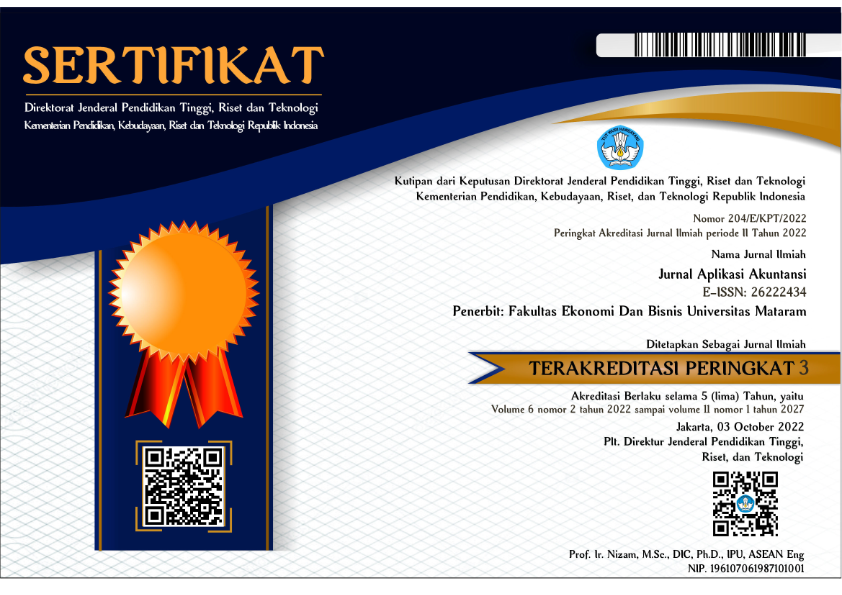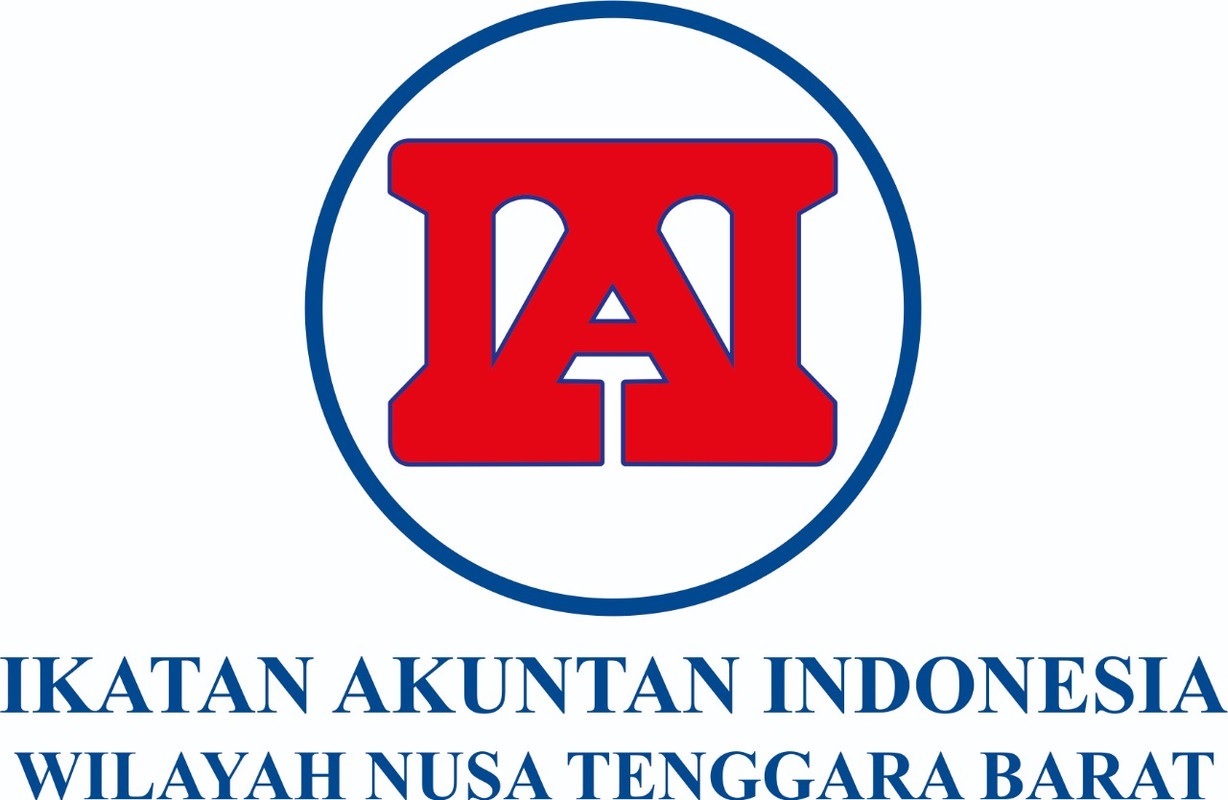PENGARUH SKEMA KOMPENSASI, SELF EFFICACY DAN PENALARAN MORAL TERHADAP SLACK BUDGETING
DOI:
https://doi.org/10.29303/jaa.v4i1.68Abstract
This study aims to examine the effect of compensation schemes, self efficacy and moral reasoning on slack budgeting. In this study the hypothesis is proposed that in the slack inducing compensation scheme the slack budgeting will be greater than using the truth inducing compensation scheme, then managers with low self efficacy will do slack budgeting compared to those with high self efficacy. It is also proposed that the individual with low moral reasoning will do slack budgeting rather than the individual with high moral reasoning. The research design in this study was a quasi 2 x 2 laboratory experiment, with Accounting students who had sat in the 5th semester of Padang State University as lower level managers who participated in budgeting. The statistical method used to test the hypothesis is two-way ANOVA. This study provides results that the compensation scheme can affect slack budgeting actions, self efficacy has no effect on slack budgeting actions, and the interaction between slack inducing compensation schemes with low self efficacy has no effect on slack budgeting actions. Moral reasoning affects slack budgeting actions, and at lower level managers who have low levels of moral reasoning and low levels of self efficacy, interactions with slack inducing compensation schemes affect slack budgeting actions. The results of this study can contribute in the management accounting literature related to budgetary slack and its causal factors.
Keyword: Slack Budgeting, Compensation Schemes, Self Efficacy, and Moral Reasoning.
References
Ajzen, I. (1991). The Theory of Planned Behavior. Organizational Behavior and Human Decision Processes, 179-211.
Anggraeni, A. (2016). Pengaruh Self Esteem, Etika, Skema Kompensasi Slack Inducing dan Truth Inducing serta Asimetri Informasi terhadap Budgetary Slack: Study Eksperimen pada Konteks penganggaran Partisipatif. Skripsi. Fakultas Ekonomi Universitas Negeri Yogyakarta.
Apriantini, N. K., Adiputra, M. P., & Sujana, E. (2014). Pengaruh Partisipasi Anggaran terhadap Senjangan Anggaran dengan Penekanan Anggaran dan Komitmen Organisasi sebagai Variabel Moderating. JIMA Undiksha, Vol. 2, No. 1.
Ardiyani, F., & Sukirno. (2017). Pengaruh Self Efficacy, Reward and Punishment, dan Asimetri Informasi terhadap Budgetary Slack: Studi Eksperimen pada Konteks Penganggaran Partisipatif. Jurnal Nominal, Vol. 6 No.1 : 66-80.
Bitlinandas, F., Kamaliah, & Susilatri. (2018). Pengaruh Partisipasi Anggaran, Penekanan Anggaran, dan Asimetri Informasi terhadap Budgetary Slack dengan Ketidakpastian Lingkungan sebagai Variable Moderasi (Studi Empiris pada OPD Kabupaten Kampar Tahun 2018). Jurnal Online Mahasiswa, Vol. 1 No.1.
Chong, V. K., & Loy, C. Y. (2015). The Effect of A Leader's Reputation on Budgetary Slack. Advances in Management Accounting, Vol. 25 : 49-102.
Chong, V. K., & Sudarso, D. (2017). The Effect of Organizational Ethical Climate and Peer Monitoring Control Systems on Budgetary Slack: An Experimental Study. Asia-Pacific Management Accounting Journal, Volume 11 Issue 2, 42.
Damayanti, G. A., & Wirasedana, W. P. (2014). Pengaruh Partisipasi Anggaran, Reputasi, dan Etika pada Kesenjangan Anggaran pada SKPD di Pemerintahan Kota Denpasar. E-Jurnal Akuntansi Universitas Udayana, Vol. 9, No. 1 : 133-142.
Dunk, A. S. (1993). The Effect of Budget Emphasis and Information Assymetry on The Relation between Budgetary Participation and Slack. The Accounting Review, 400-410.
Dwisariasih, J. (2013). Pengaruh Asimetri Informasi, Budaya Organisasi, dan Kohesivitas Kelompok terhadap Hubungan Partisipasi Anggaran dan Kesenjangan Anggaran. Skripsi. Fakultas Ekonomi Universitas Negeri Padang.
Efrilna, P. (2018). Pengaruh Skema Pemberian Insentif dan Tanggung Jawab Personal terhadap Budgetary Slack. Fakultas Ekonomi Universitas Negeri Padang.
Falikhatun. (2007). Interaksi Asimetri Informasi, Budaya Organisasi, dan Group Cohesiveness dalam Hubungan antara Partisipasi Penganggaran dan Budgetary Slack (Studi Kasus pada Rumah Sakit Umum Daerah se-Jawa Tengah. Simposium Nasional Akuntansi (SNA) X, Makassar (26-27 Juli 2007).
Hobson, J. L., Mellon, M. J., & Stevens, D. E. (2011). Determinants of Moral Judgements Regarding Budgetary Slack: An Experimental Examination of Pay Scheme and Personal Values. Behavioral Research In Accounting, Vol. 23 No.1 : 87-107.
Innocenti, S., & Cowan, R. (2019). Self-Efficacy Beliefs and Imitation: A Two-Armed Bandit Experiment. European Economic Review, 1-37.
Kohlberg, L. (1969). Stage and Sequence: The Cognitive-Development Approach Moral Action to Socialization. Chicago: Rand McNally.
Nugraheni, T. S., & Sugiri, S. (2004). Pengaruh Reputasi, Etika, dan Self Esteem Subordinat terhadap Budgetary Slack di bawah Asimetri Informasi. Journal of Indonesian Economy and Business, Vol. 19 No. 4 : 375-388.
Prabandari, S. P., & Sholihah, P. I. (2014). The Influence of Theory of Planned Behavior and Entrepreneurship Education Towards Entrepreneurial Intention. Journal of Economics, Business, and Accountancy Ventura, Vol. 17 No. 3 : 385-392.
Priyetno, A. (2018). Pengaruh Partisipasi Anggaran terhadap Budgetary Slack dengan Gaya Kepemimpinan dan Pertimbangan Etika sebagai Variabel Moderasi. Jurnal Akuntansi Fakultas Ekonomi Universitas Negeri Padang, Vol. 6, No. 1.
Puspita, L. M., & Lubis, I. R. (2017). Pengaruh Reputasi Pemimpin terhadap Budgetary Slack dengan Kejujuran sebagai Variabel Intervening: Sebuah Eksperimen. Simposium Nasional Akuntansi (SNA) XX, Jember 1-14.
Rest, J. R., Narvaez, D., Thoma, S. J., & Bebeau, M. J. (2000). A Neo-Kohlbergian Approach To Morality Research. Journal of Moral Education, 381-395.
Rifqi, R. A., Subekti, I., & Rahman, A. F. (2017). The Effect of Budgetary Participation to Budgetary Slack With External Pressure As Moderating Variable. Journal of Accounting and Business Education.
Sampouw, C. E. (2018). Experimental Study: The Influence of Pay Scheme and Personal Value to Budgetary Slack. Journal of Applied Management, Vol. 16 No. 4 : 614-621.
Savitri, E., & Sawitri, E. (2014). Pengaruh Partisipasi Anggaran, Penekanan Anggaran, dan Informasi Asimetri terhadap Timbulnya Kesenjangan Anggaran. Jurnal Akuntansi, Vol. 2 No. 2.
Scott, W. R. (2015). Financial Accounting Theory. 7th Edition. Canada: Pearson Canada.
Sprinkle, G. B. (2003). Perspectives on Experimental Research in Managerial Accounting. Accounting, Organizations, and Society, 287-318.
Stevens, D. E. (2002). The Effects of Reputation and Ethics on Budgetary Slack. Journal of Management Accounting Research, 153-171.
Sugiyono. (2017). Metode Penelitian Kombinasi. Bandung: Alfabeta.
Suharyadi, & Purwanto. (2017). Statistika untuk Ekonomi dan Keuangan Modern. Jakarta: Salemba Empat.
Waller, W. S. (1988). Slack in Participative Budgeting: The Join Effect of A Truth-Inducing Pay Scheme and Risk Preferences. Accounting, Organizations, and Society, Vol. 13 No. 1 : 87-98.
Weitzman, M. L. (1976). The New Soviet Incentive model. The Bell Journal of Economics, 251-257.
Wirjono, E. R., & Raharjono, A. B. (2007). Pengaruh Karakteristik Personalitas Manajer terhadap Hubungan antara Partisipasi dalam Penyusunan Anggaran dengan Kinerja Manajerial. Jurnal Kinerja, Vol. 11 No.1 : 50-63.
Young, S. M. (1985). Participative Budgeting: The Effects of Risk Aversion and Asymmetric Information On Budgetary Slack. Journal of Accounting Research, 829-842.









